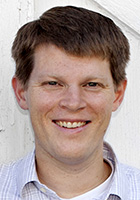reimagining cle tour highlights benefits of citywide grant program
Cleveland Neighborhood Progress recently offered a tour of its Reimagining Cleveland projects to showcase its successes and solicit ideas for the future of the program, which funds projects that reutilize vacant land for gardens, orchards, parks and yard expansions. CNP is currently completing an evaluation of Reimagining Cleveland, which has awarded three rounds of funding in five years.
Leaders say that these small-scale greening projects are critical to Cleveland's future because they fight blight, grow local food and even create jobs.
"We saw that there was a proliferation of vacant land and knew that we needed to have a response, to look at it as an asset rather than a liability," said Linda Warren, Senior Vice President of Placemaking with CNP, guiding a Lolly the Trolley bus. "Now the city is seen as a model for others around the country."
To date, Reimagining Cleveland has fostered 144 projects on 248 parcels of land. Warren admits that this is a drop in the bucket compared to Cleveland's vacant land problem -- there are more than 12,000 parcels in the city land bank, and an estimated 29,000 vacant parcels citywide. But she adds that already the program has made a significant impact in beautifying neighborhoods, increasing access to fresh, wholesome food, creating passive green space and stimulating local food startups.
For example, market gardeners in the program are banding together to launch a website to market their produce to restaurants. This is just one example of concepts that are being brought to scale thanks to Reimagining.
"This is about seeding -- pun intended -- entrepreneurs and concepts for what they can do with vacant land around them," said Warren. "It's also about seeding our own thinking. We want to figure out what's replicable and what's not."
Here are some of the highlights featured on the Reimagining Cleveland tour.
Watterson-Lake Learning Garden. Special education teacher and Detroit Shoreway resident Michelle deBock helped create a school garden on W. 75th Street. Prior to receiving funding from Reimagining Cleveland, there was a vacant lot here, and before that, an empty house that was the target of arsonists. The narrow lot culminates in an arbor and picnic area that feels like a natural oasis.
League Park Garden. Community gardens may be small, but they can have a big impact. Veronica Walton, an urban farmer in Glenville, created League Park Garden and named it to honor her father, who loved baseball. Her market garden uses harvested rainwater and contains hoop houses that allow farmers to grow crops 10 months a year. Walton sells produce at farmers markets in University Circle.
Chateau Hough. Easily the most colorful project funded by Reimagining Cleveland is Hough resident Mansfield Frazier's vineyard, which is now yielding its first grapes. The ex-con-turned-social-entrepreneur recently bottled his first vintage of wine, which he says is not only good, he can't make enough.
Frazier said that he was able to produce 1,000 bottles from his first vintage. He can't sell them yet, because the State of Ohio has not yet issued a liquor license. He claimed that demand is so high he could sell that amount five times over.
"When I applied to Reimagining Cleveland, I asked for the largest amount of money, and they said, 'What do you know about wine?'" Frazier said. "I told them I was an expert at taking the cork out of the bottle. That's all I know. But the vineyard is turning out great, and I've got the wine to prove it."
Frazier detailed the process he underwent to ensure success, including planting cold-hardy varietals and ensuring that the soil drained properly. The wine is made using a 60/40 blend -- 60 percent of the grapes are from his vineyard, 40 percent are from California. "People ask me, 'Why'd you do grapes?'" he said. "Because if I'd done bell papers, all you fine people wouldn't be standing here."
The entrepreneur says that he's employed 26 people so far, mostly young men who live in Hough and have been incarcerated or in trouble with the law. He's helped many of them find jobs. His next project, the world's first biocellar, is now under construction atop the foundation of an old house. Frazier expects to begin planting shitake mushrooms this fall, when the new League Park opens.
What's next. Warren said that the success of Reimagining projects has often hinged on having an individual champion or group of champions. Yet how do leaders sustain these greening projects over a long period of time? In the most recent round of funding, the focus turned towards side yard expansions, because this is a simple, impactful way of reclaiming green space. Warren said that to continue the program, CNP must identify new funding sources, and that the focus will turn to making sure projects are sustainable and leveraging them for impact.

